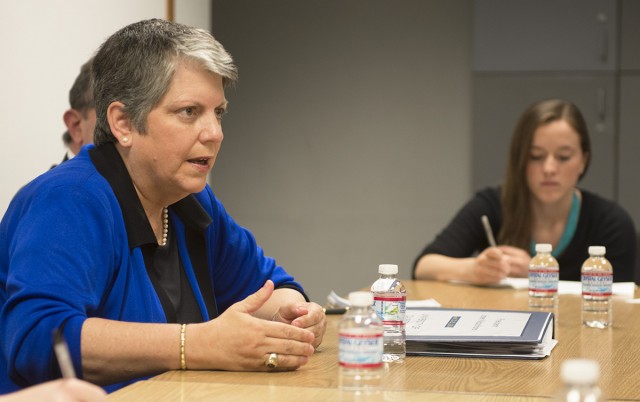UC Regents to vote on policy to raise tuition by up to 5 percent

University of California President Janet Napolitano announced a proposal to student government leaders Tuesday that would increase UC tuition by 5 percent for the next academic year. The UC Board of Regents will discuss the proposal at its next meeting, which will take place from Nov. 19-20.
(Daily Bruin file photo)
By Jeong Park
Nov. 5, 2014 10:11 p.m.
This article was updated at 12:44 a.m.
The original version of this article and the headline accompanying it contained errors and have been changed. See the bottom of the article for more information.
The University of California Board of Regents will vote on a policy in two weeks that would allow the UC to raise tuition by up to 5 percent each year for the next five years, depending on state funding.
UC officials said in the proposal that it aims to make tuition increases more predictable for students. The proposal would also allow the UC to enroll 5,000 more in-state students over those five years.
UC President Janet Napolitano announced the potential policy change Tuesday in a meeting with University student government leaders in Oakland, said Kevin Sabo, the UC Student Association board chair for UC Berkeley. With a 5 percent tuition increase, in-state undergraduate students would pay about $610 more and out-of-state undergraduate students would pay about $1,750 more per year. Currently, in-state students pay $12,192 and out-of-state students pay $35,070 for tuition and fees.
If enacted, the policy will bring the in-state tuition to $15,563 by the 2019-2020 academic year.
Under the proposed policy, tuition increases would depend on how much money the state allocates to the UC. The UC will give legislators and Gov. Jerry Brown a specific amount of the money it needs to avoid the tuition hike, he said. If the state does not give the UC the amount requested, the regents will consider raising tuition.
Sabo said Napolitano told student government leaders that she wants tuition rates to remain stable, avoiding a massive increase in a single year. In 2011, the UC raised its tuition by a 17.6 percent. The year before, the University raised its tuition by 16.8 percent.
The University has had a tuition freeze since the 2011-2012 academic year because of the passage of Proposition 30 in 2012, which brought the UC more state funding with temporary tax hikes scheduled to expire in 2017.
The University is scheduled to receive 4 percent funding increases from the state until the 2016-2017 fiscal year under Brown’s multi-year funding agreement, which began in 2013. However, that agreement is contingent on a tuition freeze until 2017 as well. Brown’s office could not immediately be reached for comment.
The plan assumes this agreement will continue, according to the University.
Sabo said he was disappointed to learn about the possible tuition increase, and that he thinks the UC is using students as pawns in a political strategy.
“The UC, legislature and California governor have played hot potato in terms of taking responsibility for looking out for student interests,” he said.
The UC could not immediately be reached for comment. Napolitano and the UC Vice President of Budget and Capital Resources Patrick Lenz are scheduled to discuss the budget during conference calls with the media Thursday morning.
Compiled by Jeong Park, Bruin senior staff. Contributing reports by Amanda Schallert, Bruin senior staff.
Correction: Both tuition and fees could be raised under the policy. The policy could raise tuition by up to 5 percent.


